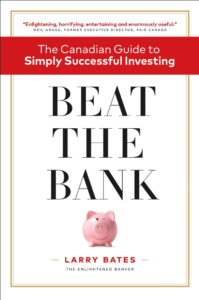Special to Financial Independence Hub
My book, Beat the Bank: The Canadian Guide to Simply Successful Investing, was published in September 2018. Five years later it continues to be a best seller among Canadian business/investing books.
The book, along with my website and various articles I’ve written have helped many Canadians learn to invest smarter and build (and maintain) larger retirement nest eggs.
Most Canadians continue to be directed by their banks and other advisors to invest through mutual funds. The vast majority of these mutual funds extract annual fees ranging from 1.5% to 2.5% from the value of the investment.
Not only are most Canadians unaware of these fees, very few investors understand the compound damage these fees do over time. Over a lifetime of investing, these fees can reduce retirement nest eggs by 50% or more.
At the same time, the investment industry, including the same banks that sell high-cost mutual funds, offer very low cost, very efficient investment funds (ETFs) that track market indexes. (There are many other types of ETFs as well. In my view most investors would be well served by sticking to simple index tracking ETFs).
Smarter investing means getting out of high-cost mutual funds and getting into low-cost investment products and services like index ETFs through do-it-yourself investing, using robo-advisors or finding lower cost traditional advisors.
A lot has happened in the world since Beat the Bank was published five years ago. Covid-19 did a lot of damage and led to a great deal of unanticipated change. Inflation spiked dramatically causing central banks to raise interest rates. The full impact of higher rates is yet to be fully felt, especially by homeowners whose mortgages will be renewing in the next year or two.
The good news for investors is that bonds and GICs are finally offering decent returns although we will have to wait and see whether earning 5% interest will outpace inflation. And, despite all the uncertainty and chaos over the past five years, the total return of S&P 500 was a pleasing 70% while the total return of the S&P/TSX was 42%.
What hasn’t changed?
- Markets continue to be uncertain (this never changes!)
- The majority of “advisors” are under no legal obligation to act in their client’s best interest
- The majority of “advisors” put millions of Canadians into high-cost mutual funds
- Many prominent mutual funds have not reduced their fees (Why would they lower fees when investors are unaware of the impact of fees?)
- Mutual funds continue to underperform simple index ETFs
- Regulators have made some progress but many critical investor protection measures have yet to be implemented
The Beat the Bank project, which was sparked 7 years ago by my sister’s experience with mutual funds, has been a gratifying experience. I have received hundreds of messages from readers over the past five years, the great majority with positive feedback.
You can get a sense of reader response by checking out Amazon reviews. I certainly have had negative reaction from some advisors and industry people generally, but most professionals recognize the shortcomings of the industry and want to see investors achieve better outcomes with simpler, more efficient investment products and services.
DIY investing not for everyone
Do-it-yourself investing it’s not for everyone. But if you are considering switching to DIY investing, whether you check out my book or other independent sources (books, blogs, podcasts, etc.), I strongly encourage you to take some time to learn investment basics.
Here are just a few tips from Beat the Bank readers for those considering making the move:
“I have found that ETF equity investing is better for me than buying individual stocks.”
“Think your plan through, know yourself and then stick with your plan. Tweak it when life circumstances change, otherwise try to tune out the noise and the hype.”
“Fees matter and their impacts are huge so don’t underestimate them. High fees on my mutual funds at the bank kept gains in my portfolio dismal, compared to what I’ve achieved through my DIY portfolio at an online brokerage.”
“I executed my first stock buying transaction, very carefully I would go through the steps one by one before I was comfortable with my first purchase. Over time I got more confident using the DIY approach. I now have a lot of good blue chip dividend paying stocks and a few ETF’s tracking the US index.”
“I know there are other online discount brokers and some may be better than my bank’s. But using my bank’s online brokerage helped me be confident switching to DIY.”
“I would say that the most difficult part of DIY investing is opening an account. Take the plunge, it ‘s the best decision you will ever make.”
“Develop a plan; start soon, even before you think you can; seek unbiased trustworthy advice; recognize the progress; accept setbacks; monitor and adapt, don’t abandon. Investing is like any other skill: start small, start slow.”
“Don’t be afraid of experimenting by starting the move with a small amount. Take $1K and open an account somewhere – if you don’t like it, close it, and try the next institution or approach.”
“Get your toes wet” by opening a self-directed investment account. Perhaps try it with your next TFSA or RRSP contribution. Learn how to do buys, sells, rebalancing, and tracking of cost basis. Learn and grow.”
“Personal finance is personal so don’t compare yours with others and don’t blindly copy what others are doing or what the newest fad is. Financial literacy is the name of the game so use your knowledge to propel your finances.”
“Make sure you and your partner both know what is happening with your money. No one is going to care like you will! If investing and numbers aren’t your thing, make sure you’re not getting hosed before you let a complete stranger put their hands around your money. If you can, get at least some basic financial education.”
 Larry Bates is an independent investor advocate, author, consultant and speaker. Larry enjoyed a 35-year banking career with several major financial institutions in Canada and the U.K. including as Global Head of Debt Capital Markets for RBC. Larry is on the board of FAIR Canada, “Canada’s Investor Rights Advocate.” He is a graduate of Dalhousie University.
Larry Bates is an independent investor advocate, author, consultant and speaker. Larry enjoyed a 35-year banking career with several major financial institutions in Canada and the U.K. including as Global Head of Debt Capital Markets for RBC. Larry is on the board of FAIR Canada, “Canada’s Investor Rights Advocate.” He is a graduate of Dalhousie University.
He is a graduate of Dalhousie University.



